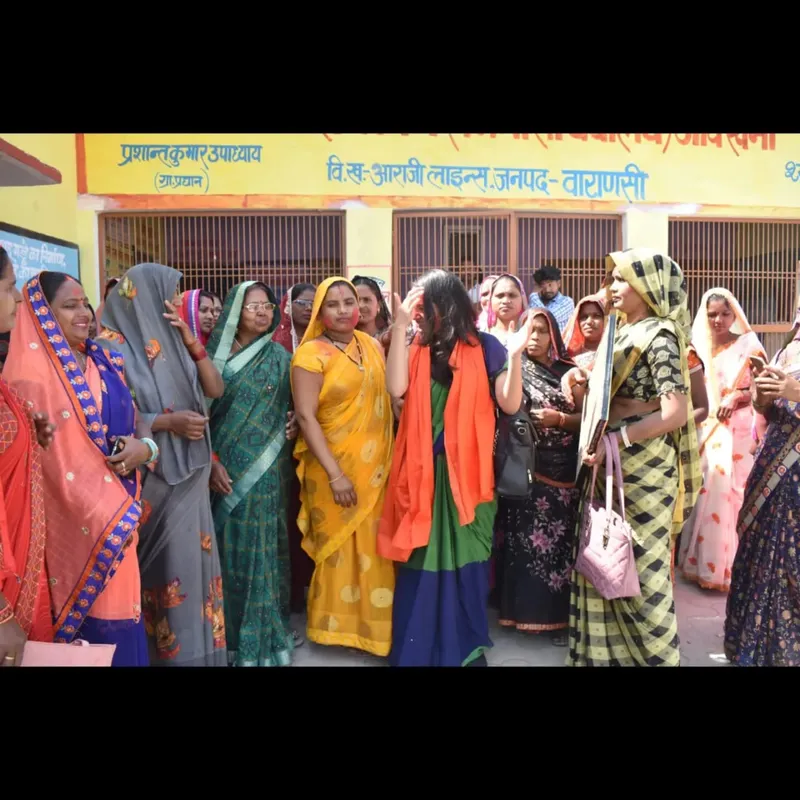[100 Emerging Women Leaders] How Rimjhim Gour is mobilising women voters and empowering grassroots communities
Rimjhim Gour is the founder of Sapiens Research, a social impact consultancy that provides socio-political solutions and works towards empowering grassroots communities across India.
In the 2024 general assembly elections, Sapiens, a social impact consultancy led by Rimjhim Gour, collaborated with the ruling Bharatiya Janata Party (BJP) to engage and mobilise one crore women voters across the country.
Gour achieved this in consultation with seven lakh self-help groups (SHGs) across the country, making a significant impact on India’s democratic landscape.

Rimjhim Gour
Born and raised in Jabalpur, Madhya Pradesh, Gour grew up among people from different walks of life–from vegetable sellers to cobblers, which helped shape her early understanding of social structures.
“Though everyone in my family was very educated, I was surrounded by people from different backgrounds. I grew up spending time with them, and listening to their stories,” she recalls.
Her passion for storytelling led her to study journalism at the Indian Institute of Journalism and New Media (IIJNM) in Bengaluru. Through a capstone project in Hubballi and Dharwad in Karnataka, she got her first taste of rural reporting.
“I extensively covered farmer suicides, which was a big issue back then,” she says.
After completing her journalism course, Rimjhim joined the political consultancy IPAC in 2018, which deepened her connection with grassroots politics.
During the COVID-19 pandemic, Gour travelled alone to Bastar, a Naxal-affected region in Chhattisgarh, to document the stories of surrendered Naxals and their families.
“People always talk about clashes, but no one actually cared about what happened to those families,” she points out. She covered stories of surrendered Naxals, families who lost their loved ones to Naxalism, and more.
The experience in Bastar solidified her belief that rural communities, especially women, were often overlooked in policy discussions. This led her to establish Sapiens Research in 2021, a for-profit consultancy focusing on increasing female participation in democracy and social development.
Mobilising women voters

Community engagement
In 2023, Sapiens worked with the BJP for the first time to mobilise women voters in Madhya Pradesh. It also set the stage for their later efforts nationwide.
“The state had a women-centric scheme where they were given a monthly allowance. We wanted to understand how women were utilising this. After we completed that research, we also understood a lot of them were not aware of why they had to vote, and most of them were voting, influenced by their husbands,” she explains.
Gour reiterates that the idea was not to influence them towards one party but to vote in the first place.
“We built a cohort of 10,000 people from the CM Fellowship programme, trained them to mobilise the women to vote,” she adds.
In last year’s general elections, Gour decided they were not going to tell anyone how to vote. “Rather, we would focus on getting registered women, who have either never voted or haven’t voted consistently, to actually turn up at polling booths,” she explains.
Their strategy involved leveraging India’s vast network of SHGs. “Each SHG member ensured at least one woman from their local area, who did not vote last time, went out to vote with them,” Rimjhim shares. This model, replicated in Maharashtra’s recent assembly elections, mobilised 12.5 lakh women.
Beyond just mobilising voters, Sapiens also organised workshops on civic education, ensuring that women understood the importance of their vote beyond immediate electoral benefits. “Many women vote based on their family's decisions or immediate incentives, but we wanted to ensure they understood the larger democratic impact,” she says.
Gour believes one of the biggest challenges in mobilising women voters is urban apathy. “Ironically, in a country like ours, it’s easier to get rural women to vote than urban women. Rural women are direct beneficiaries of government schemes, whereas urban women, as taxpayers, don’t feel as connected to election outcomes,” she elaborates.
Another challenge was tracking participation. “Most SHGs don’t have tech exposure, so even if they mobilised voters, we needed a reliable verification system,” she notes. To tackle this, Sapiens used AI-powered call bots to confirm voter turnout and is now developing wearable tech for SHG members.
“We are trying to innovate watches where they can speak, and the watch can give us a dashboard of real-time participation,” she reveals.
Empowering SHGs to aim higher
Sapiens works with 20,000 SHGs in Uttarakhand and Himachal Pradesh, focusing on organic products and handmade goods. Its project, ‘Tokree’, in partnership with ONDC, aims to scale SHG products to larger markets.
“A lot of SHGs can produce goods but don’t have inventory or buyers. Our idea is to first secure buyers, then help them polish their product and reduce turnaround time,” she explains.
Additionally, Gour is spearheading a new initiative to connect SHGs with ecommerce platforms to expand their reach. “Many SHGs produce amazing handmade products, but they lack access to digital platforms. We are helping them list their products online and streamline logistics,” she states.
Sapiens operates with a full-time team of 45 professionals who manage strategic operations, training, and project execution. In addition to this, a large network of contract-based field workers ensures the implementation of voter mobilisation and self-help group empowerment initiatives across multiple states.
Taking her vision beyond India, Rimjhim is now working on connecting SHGs and SMEs from India and Indonesia with mentors and micro-investors in Singapore. “We are building something where small businesses from India and Indonesia can find guidance and funding in Singapore, which has the purchasing power and a sophisticated ecosystem,” she says.
Gour believes that success in impact consulting requires extreme clarity of purpose. “You need to be focused on one geography, one set of people, and one specific service. Also, always check what policies the government already has—it helps in aligning your work with existing frameworks,” she advises.
She reveals that when she started at 26, she wasn’t taken seriously. “Whether it was because I was young or a woman, I don’t know. But today, the same people want to work with me because they’ve seen the results,” she reflects.
She hopes to replicate her model in more states and even internationally, to ensure that voices of women and rural communities continue to shape democratic and economic policies.
Edited by Megha Reddy


![[100 Emerging Women Leaders] How Rimjhim Gour is mobilising women voters and empowering grassroots communities](https://images.yourstory.com/cs/4/8e7cc4102d6c11e9aa979329348d4c3e/100EWLRimjhim-GourFeatureImage-1738379698966.jpg?mode=crop&crop=faces&ar=16%3A9&format=auto&w=1920&q=75)




